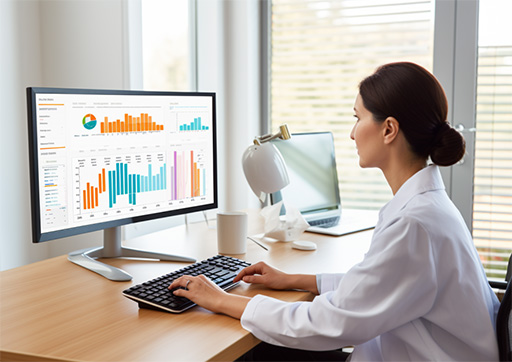Health Information Managers For Better Patient Care

The 21st century has seen a nationwide shift from paper-based health forms to electronic health records. This transition from analog to electronic health records (EHRs) has enhanced healthcare efficiency, not just for doctors but also for patients. It has enabled physicians to give more special care by looking into a patient’s medical history easily, and patients are empowered to take a more active part in their health.
What Is Health Information Management?
Information saves lives. In the medical industry, this is especially true. Access to patient health data allows health care business administrators, doctors, and nurses to make critical care decisions that can make all the difference in the world for patients. Health information systems seamlessly and effectively integrate health services and information technology.
They are critical to getting health data into the right hands as fast as possible. Healthcare organizations can use a health information system to gather, store, and manage data. Doctors and nurses make data-driven judgments about many aspects of patient care using health information systems. Quick access to a patient’s medical history, for example, can reveal previous therapies.
But they are not the only ones who benefit from it. Administrators can use health information systems to study statistics about different departments or procedures to allocate better or manage resources. Furthermore, health information systems include specific clinicians or healthcare organizations, such as regularly utilized therapies or interventions associated with the most significant outcomes. Here are some benefits of digital healthcare information systems:
- Improved speed and accuracy of patient care
- Easy access to medical office administration data improves better hospital management
- Cost control, making services more accessible
- Expanded service capacity
- Lower labor expenses and inventory levels
- Overall, it improves the quality of patient care
Anyone who wants to be a vital member of a healthcare management needs to be familiar with these systems. It is the thin line between poor and excellent patient care. For outstanding services in this department, you’ll need a qualified health information manager.

What Do Health Information Managers Do?
Health information managers (HIM) are professionals who oversee health information systems in medical centers. They protect information such as patients’ health information data. These include symptoms, medical histories, test results, and procedures. In simple terms, they organize, oversee, and protect medical data.
As administrative specialists, health information managers ensure the quality, accuracy, accessibility, and security of traditional and digital medical data. They are an essential link between doctors, patients, and third parties. They are educated in information technology and frequently link clinical, operational, and administrative duties. They also help hospitals stay compliant with federal legislation requiring the use of electronic medical records.
Health information systems, as previously said, have transformed healthcare delivery. However, history has shown that the benefits of these technologies do not appear immediately after implementation. There may be operational issues that affect the timing, accessibility, and accuracy of information. As a result, hiring a capable HIM is one path to successful information systems.
Typical Responsibilities
It is an exciting profession where people wear many hats, even when working in small facilities. Here are some of the tasks health information managers are expected to carry out:
- Enters and maintains information in the electronic medical record (EMR)
- Organizing and maintaining data for clinical databases and registries.
- Ensure that electronic patient health records are secure.
- Keep up with the latest best practices and emerging trends in the field of health information security.
- Manage health data, using classification systems to code and categorize information.
- Maintain Accurate Patient Histories.
- Keep reliable patient data for insurance reimbursement.
- Maintain both electronic and analog (paper-based) records.
- Reviewing records for completeness and accuracy
- Tracking medical outcomes to assess quality.
- Maintaining confidentiality.
- Establishing and effecting departmental objectives and strategic initiatives.
- Ensure legal compliance with regulatory agencies at the federal, state, and municipal levels.
- On-site and remotely, hire, train, and manage health information technicians.
- Communicate with physicians and other technological, clinical informatics, and service workers.
- Documentation of medical records
- Medical coding
- Preparation of internal and external audits with written assessments and reporting.
- Designing information processes and systems
- Health information security
- State and federal privacy practices and laws
- Data integrity at the corporate level
These and many others are some of the responsibilities of health information specialists who often work with you as the physician, your patients, registered nurses, and other health care professionals. This way, they can clarify information needed in maintaining the accuracy and completeness of medical records.
Health Information Management Growth
Health information managers guarantee that medical information is reliable and securely kept. Nurses, physicians, and other health care workers have access to it when and when they need it. They are unquestionably essential in every medical establishment.
Doctors and medical administration boards also aim to perfect these systems for tracking medical data. Aside from that, the sector develops dramatically as the population ages, necessitating more medical services.
Vital Qualities And Skills
- Attention to detail – When coding and recording patient information, accuracy is critical because health records affect your patients’ health and the liability of those involved in their record keeping.
- Technical Skills – They must have a thorough understanding of classification and coding software. They must specifically understand the electronic health record (EHR) system utilized by the organization or practice where they work.
- Interpersonal capabilities – A HIM must communicate the complicated issues of patient information and data requirements to other professionals who are not experts in the subject clearly and straightforwardly. They must also be mindful of the state of patients to have a positive relationship with them.
- Strong analytical skills – They must be able to read and understand medical records and know how to code them.
- Integrity – Because health information specialists are entrusted with personal patient information, they must possess a strong sense of integrity, obligation, and ethics. To maintain patient confidentiality, they must be vigilant and cautious.
Safeguarding Patient Information

As a doctor, you can entirely rely on HIMs to satisfy your concerns about data security. Healthcare IT teams guarantee that healthcare practitioners have secure access to patient health information. These groups are overseen by health information managers, who control electronic medical records storage, protection, and accessibility.
Health Information Managers and BioScan
BioScan technology has eased the work of HIMs by improving the availability of data. These devices can scan the body against thousands of substances to find sensitivities and stressors through Electrodermal screening. Furthermore, they gather immediate real-time results. It can give you the peace of mind you need knowing that patient assessment is timely. Data plotted on an easy-to-read chart can be stored for future reference.
It will be mainly because of increased efficiency, and though you may not be there to countercheck, your health information manager will. BioScan system also offers supplementary services like nutritional testing that can further help improve your patients’ health.
The Future of Health Care
With efficient health information systems, medical practices can compete better and thrive in today’s increasingly digitized medical landscape. Doctors are in a better position to reach healthcare goals as quickly as possible. With the help of health information manager career professionals, you can provide the best results for your patients.
